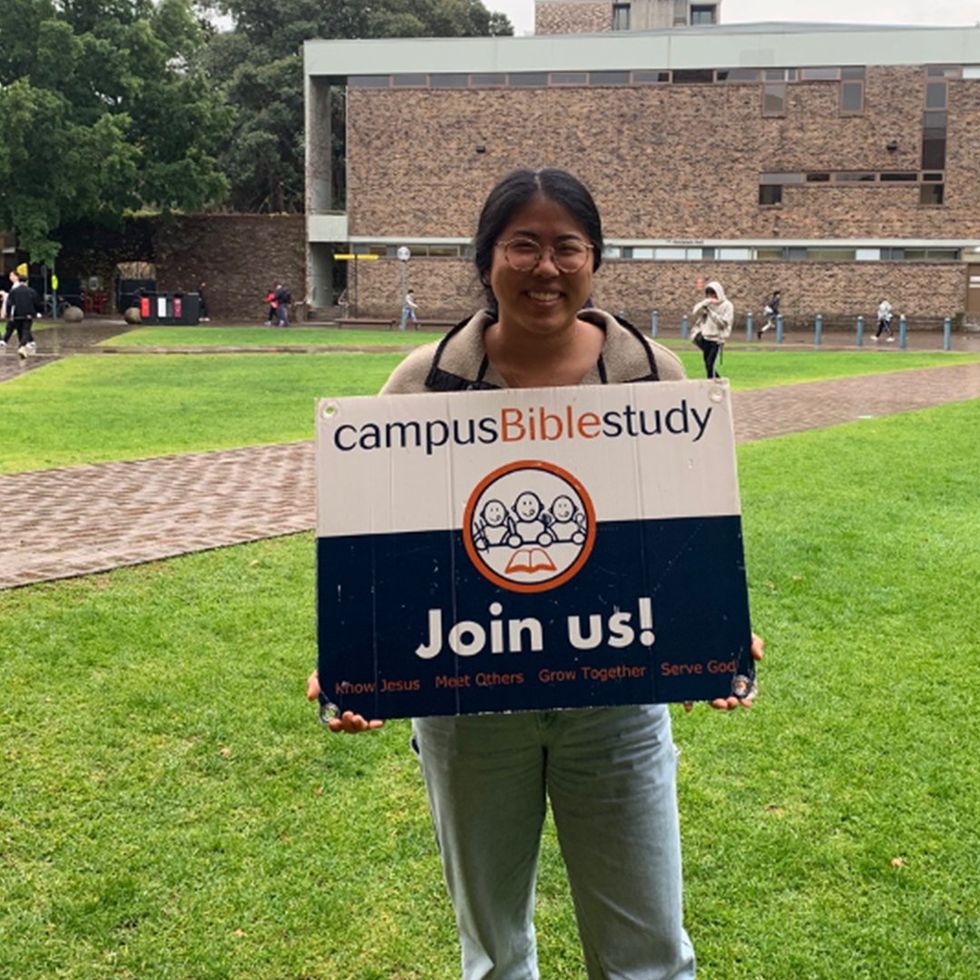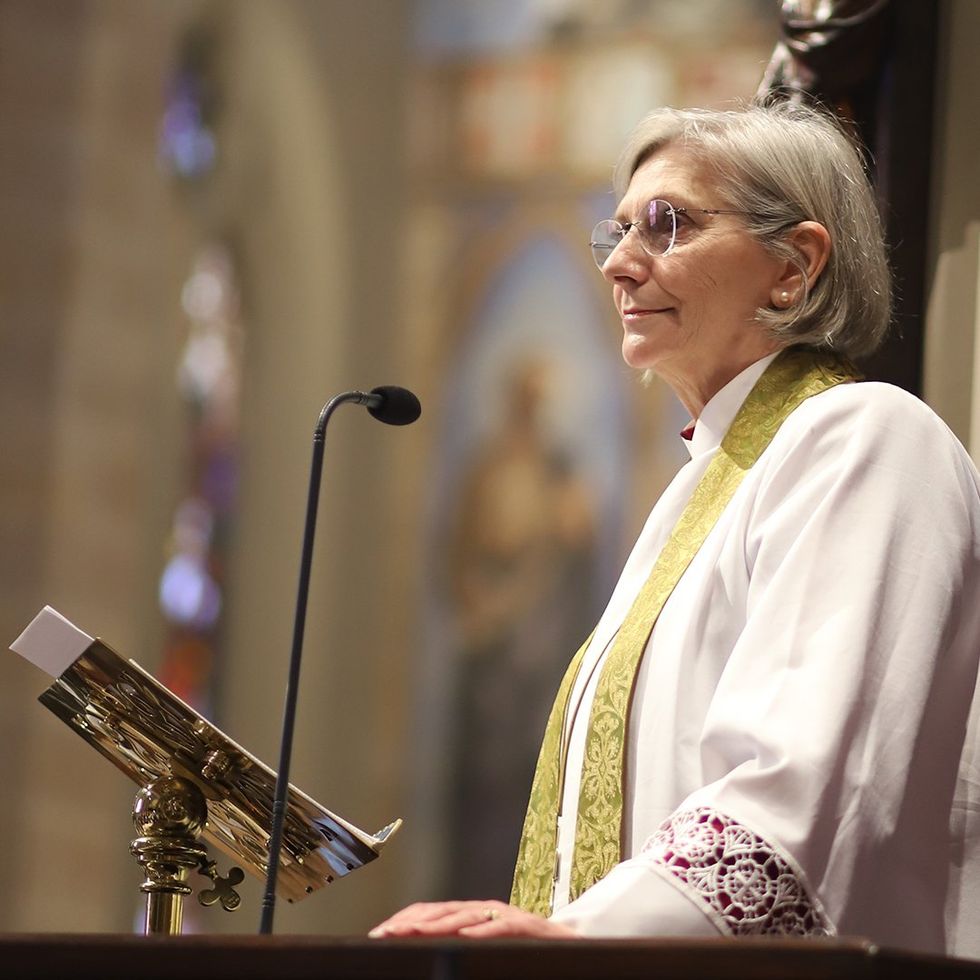Sydney is one of only three Anglican dioceses in Australia where women cannot hold leadership roles over men in the church.
The sun bounces off the stained glass windows that wrap around the church, casting rainbows of light on the congregation dressed in their Sunday best. It’s a traditional service with a church choir and priests in robes. There are Bible readings, hymns sung and prayers offered. Then it's time for the sermon.
In the pulpit at Christ Church St Laurence, Haymarket, last Sunday, the Most Reverend Kay Goldsworthy, Archbishop of Perth, steps up to preach. It is the first time a female Archbishop has preached in the socially conservative Sydney Anglican Diocese.
JULIE CROWLEY
Archbishop of Perth Kay Goldsworthy recalls looking to the 'outspoken, untidy' Movement for the Ordination of Women community when she was so uncertain of the future.


Goldsworthy had flown into Sydney from Perth to celebrate the 40th anniversary for the Movement of the Ordination of Women (MOW), an organisation established to protest the lack of women in leadership positions within the Anglican Church. She required a special dispensation from the diocese (a district under the pastoral care of a bishop) to do so.
Dr Jacqueline Service, a lecturer in theology at St Marks National Theological Centre in Canberra, is very familiar with Sydney Anglican restrictions on how women can serve the church. She found, after extensive research, she "couldn't marry what I was being told by Sydney Anglicans and its very restrictive, legalistic view and what I was actually seeing God engaged with women in Scripture".
Service, speaking with Newsworthy by Zoom, had grown up in a Christian household but left the faith and become a “wild child”. She recalls her “dramatic conversion” to Christianity. "I was actually stoned when I had a supernatural encounter and my whole life changed in that instant.” She was arguing with her boyfriend at the time when she randomly blurted out “I’m thinking about going back to God”. She was instantly sober and clear headed.
'I will vehemently stand up against what I believe is the restriction of the movement of the spirit in women.'
Following her conversion, Service wanted to proclaim her faith to others, however she quickly realised that she was restricted in the ways she could do so. Sydney Anglicans do not allow women to serve in all levels of leadership within the church. Women can be deacons, meaning they can assist priests in worship services and care for members of the church. They cannot become priests or bishops and therefore must receive permission to teach or preach to the wider church.
Unable to accept this "legalistic view" of the role of women, Service left the Sydney Diocese's constraints behind. While she was never ordained, she teaches theology to both men and women in Canberra.Other women, however, have continued to find their place within it.
Sheina Chen is a female ministry worker for Campus Bible Study, a Christian group at the University of New South Wales. She believes that God has outlined distinctly different roles for men and women in the Bible.
“We do see that there are different roles for women in the Bible that God has made. You're treated differently in that guys are described as being the head of the church, the head of the family, and they're in more positions of obvious leadership as they look after the campus ministry that we have here. Women are described as sort of a helper.”
For Chen, despite this seeming imbalance in the importance of men and women's roles within the church, “we're all equally valued as people… doing God's work”.
Like Service, Chen has also long studied what the Bible says about women. She, however, came to a different conclusion, namely that the Bible says men have a distinct role in leading the church that women do not. When exploring this issue she says “it really frustrated me”. She felt that “I can do the exact same things as men, and I can do it better. But then realising, just because you can do it doesn't mean it's a good thing to do in God's eyes”.
Both Service and Chen reference the same part of the Bible in describing their views but again showcase their different understanding of it. When discussing the creation of men and women in the Bible's Book of Genesis, Chen sees that “God makes Adam first and Eve is described as being his helper, equal in value. Both equally made in the image of God and God loves them both, but they have different roles there.”
Service also believes that both are made in the image of God, yet “there’s symmetry in relationality between male and female,” she says.
At the Christ Church St Laurence service last Sunday, Goldsworthy reflected on the ultimate gift of God’s grace. She said God’s grace was all about inclusion. She described her desires as a young woman to serve God and how she felt fear towards the church. She recalled the “outspoken, untidy MOW community I remember looking to as a young woman when I was so uncertain of the future,” describing them as “women and men of grit, grace and spirit”. In Sydney this week, she still required special permission from the Sydney Diocese to preach and was unable to carry out traditional responsibilities such as leading Holy Communion.
Many Christian women feel a calling to serve God in positions of leadership. Service says emphatically she “had this fire in my bones that I needed to teach theology and be in leadership.” She laments that she used to pray “for God to take away the spirt propelled desire to proclaim him”.
Service saw that God kept using women in the Bible, at a time where it was contextually accepted and expected for women to be excluded. She says that she had been inadvertently taught to ignore the women in the Bible, saying for her, “[Women] just melted into the background of being unimportant in God's overarching plan for the world".
Today, women make up 25 per cent of people working in Anglican churches in Australia.Only three of the nation's 23 Anglican dioceses do not support women in all levels of leadership in the church — the Sydney, Armidale and North West Australia dioceses. Service calls for Christians who don’t believe that women should be able to lead in churches to “stop being hypocritical".
“I will vehemently stand up against what I believe is the restriction of the movement of the spirit in women," Service says.
Chen concedes that “if you don't know heaps about religion, except for the fact that Christians have particular views on women ... if that was the only thing you knew and that was not your worldview, then I think there'd be a lot of reason for you to not want to be a Christian or even engage with that worldview.”
She does however uphold the importance of women in ministry, particularly ministering to other women and to children. She is content with her role within the church and reflects that, “It's been a long journey of trying to humbly see what the Bible says and not let my goals and my desires shape how I live, but rather what God says is good.”


